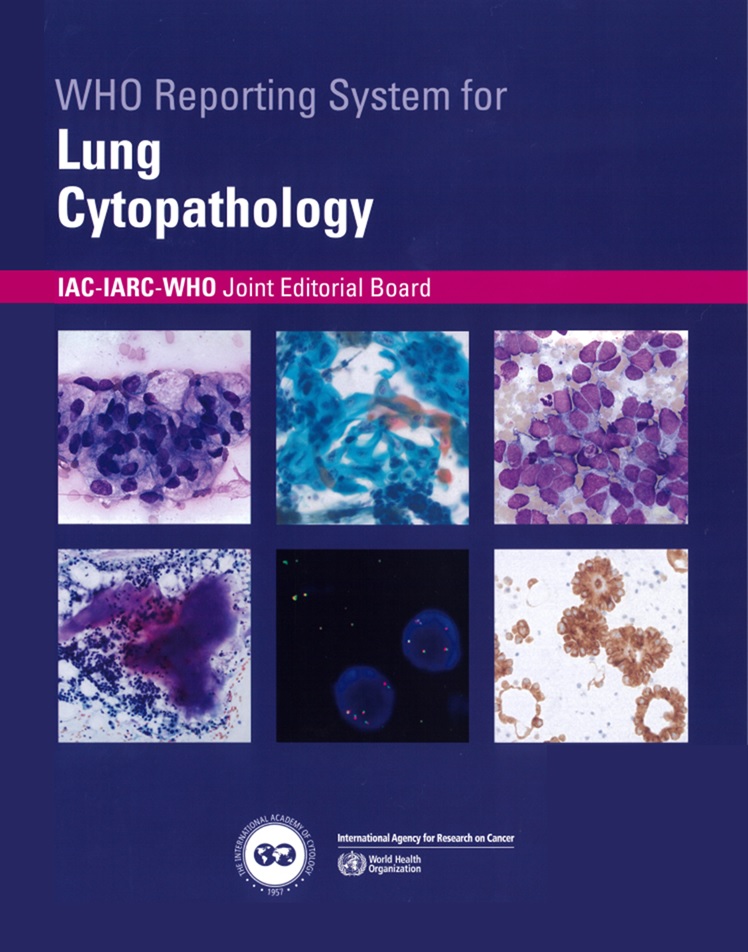WHO Reporting System for Lung Cytopathology
- IAC-IARC-WHO Cytopathology Reporting Systems, Vol.1
| 著者 | : IAC-IARC-WHO Joint Editorial Board |
|---|---|
| 出版社 | : WORLD HEALTH ORGANIZATION |
| ISBN | : 978-92-832-4516-2 |
| ページ数 | : 210pp. |
| 出版年 | : 2022年 |
在庫
定価25,410円(本体23,100円 + 税)
- 商品説明
- 主要目次

本書は国際細胞学会(IAC)と、世界保健機関(WHO)の専門機関である国際がん研究機関(IARC)の共同プロジェクトとして開始された細胞病理学の新シリーズ第1巻である。確立されたエビデンスと細胞病理学の実践を統合したユニークな内容となっており、現在第5版が刊行されるWHO腫瘍分類シリーズと連動している。
細胞病理医が腫瘍を見る視点は他の専門家とは若干異なる。腫瘍の診断における細胞病理学的特徴に基づいた専門的な報告システムが求められ、診断カテゴリーの階層システムの中で、標準化された報告書によって提供される必要がある。診断カテゴリーは、臨床医とのコミュニケーションを改善し患者ケアをサポートするために、診断管理の推奨事項とリンクされていなければならない。そしてこれらの報告システムは、医療資源が異なる環境にいる世界中の患者のニーズに応えるために、国際的に標準化されていることが極めて重要である。
本書は、細胞診検査を世界的に標準化するために不可欠なツールであり、細胞病理学的研究を実践に移すための役割を果たす。診断上重要な細胞病理学的特徴は、腫瘍の種類ごとに定義された診断カテゴリー下に列挙され、正確かつ統一された言葉で説明されている。これらの診断基準は、初めて国際的なコンセンサスを得たものであり、この分野の専門家によって評価・議論されたエビデンスに裏打ちされている。各病変別セクションには、医療資源の乏しい環境を含む全世界で使用が可能な細胞病理学的特徴の鑑別診断を論じた専用の項目があり、その後の項目で細胞病理学的材料に対する補助検査(次世代シーケンサーを含む)の現在のベストプラクティスな適用を説明する。
IAC-IARC-WHO Cytopathology Reporting Systemsシリーズはこちら
本書のここに注目!
●約60名の著者・編集者により作成されている
●世界各国からの寄稿者により、国際的な専門知識を反映
●300点以上の高画質画像
●1,000以上の参考文献
List of abbreviations
Foreword
1 Introduction to the WHO Reporting System for Lung Cytopathology
Background
The role of lung cytopathology
Diagnostic categories and report structure
Risk of malignancy and management recommendations
2 Lung cytopathology techniques
Sampling methods
FNAB techniques and specimen management
Bronchial wash and bronchial brush techniques and specimen management
Bronchoalveolar lavage techniques and specimen management
Sputum sampling techniques and specimen management
Rapid onsite evaluation
Cell preparation methods
Ancillary testing
Introduction: The role of ancillary testing
Immunocytochemistry
In situ hybridization
Molecular testing
3 Diagnostic category: Insufficient/Inadequate/Non-diagnostic
Introduction
Definition
Discussion and background
Risk of malignancy and management recommendations
Sample reports
4 Diagnostic category: Benign
Introduction
Definition
Discussion and background
Risk of malignancy and management recommendations
Inflammatory processes
Acute inflammation and suppuration
Histiocytic, lymphocytic, and eosinophilic inflammatory patterns
Granulomatous disorders
Inflammatory and reactive changes in glandular cells and squamous cells
Benign neoplastic lesions
Pulmonary hamartoma
Sclerosing pneumocytoma
Solitary tracheobronchial papilloma
Salivary gland neoplasms
PEComa
Spindle cell tumours
Meningiomas
Granular cell tumour
Ectopic thyroid and parathyroid tissues
Sample reports
5 Diagnostic category: Atypical
Introduction
Definition
Discussion and background
Risk of malignancy and management recommendations
Sample reports
6 Diagnostic category: Suspicious for malignancy
Introduction
Definition
Discussion and background
Risk of malignancy and management recommendations
Sample reports
7 Diagnostic category: Malignant
Introduction
Definition
Discussion and background
Risk of malignancy and management recommendations
Specific malignant lesions
Non-small cell carcinomas
Adenocarcinoma of the lung
Squamous cell carcinoma
Non-small cell carcinoma NOS
Other specific carcinomas
Salivary gland–type carcinomas
Adenosquamous carcinoma
Pleomorphic carcinoma
Pulmonary blastoma
Carcinosarcoma
NUT carcinoma
Thoracic SMARCA4-deficient undifferentiated tumour
Neuroendocrine neoplasms
Neuroendocrine tumours
Carcinoid/neuroendocrine tumours of the lung
Neuroendocrine carcinomas
Small cell lung carcinoma
Large cell neuroendocrine carcinoma
Lymphoproliferative diseases
Lymphomas
Pulmonary Langerhans cell histiocytosis
Erdheim–Chester disease
Other malignancies
Spindle cell tumours
Paraganglioma
Diffuse pleural mesothelioma
Primary germ cell tumours of the mediastinum
Primary angiosarcoma of the lung
Pulmonary and thoracic metastases
Sample reports
8 Management recommendations for each diagnostic category
Introduction
Insufficient/Inadequate/Non-diagnostic
Benign
Atypical
Suspicious for malignancy
Malignant
Contributors
Declaration of interests
Sources
References
Subject index




